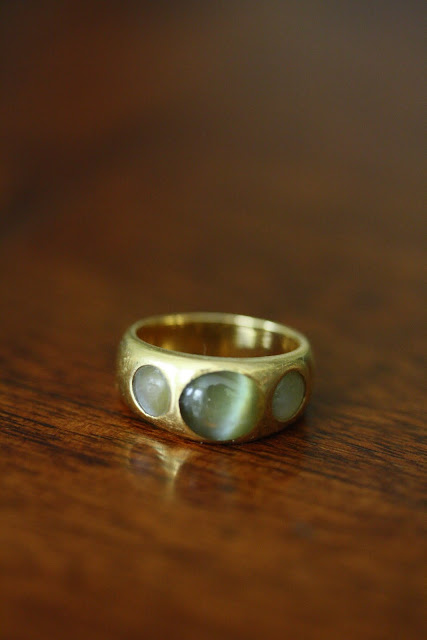 |
| His ring, my way |
(Those who are coming to this serialized story for the first time, you can read the complete opus to date by clicking here.)
The jeweler ordered Vivian and me not to move. He grabbed a pen flashlight and dropped onto all fours, scouring the floor for the two cat’s eye gems that had vanished from his spatula.
Vivian whispered to me, “Your grandfather doesn’t want you to change the ring.”
“I don’t care what he wants,” I muttered back. “I have better taste than he does.”
I had in mind what the psychic had told me: that Grandpa, when he was alive, was accustomed to having his own way and was easy to work with if you followed along. I thought, well, I’m headstrong, too. I figured that with a ghost, it was the same as with children and pets: you had to establish who’s in charge at the beginning of the relationship; otherwise they will become unruly and scorn your wishes.
The jeweler continued his search of every nook and cranny of his office, even asking us to remove our sandals and brush our skirts. Finally he gave up, looking both desperate and mystified. “It’s very strange. I saw them fall…Maybe you can leave your number, in case they turn up.”
“No,” I said. “I’ll pick out another pair.”
I had him open the tissue to look at the remaining gems, and selected two that matched. They weren’t anywhere near as nice as the missing ones, but I was determined to get this done and show Grandpa who was boss. The jeweler took no chances this time, placing the envelope a millimeter away from the stones and quickly sweeping them inside.
A week later, the ring was ready. I returned with Vivian. We knocked; the jeweler opened the door. His brow was furrowed; he looked thoroughly flummoxed now. “You won’t believe this,” he said. “After you left last time, I took apart everything in the office looking for those stones. I couldn’t understand how they could have disappeared so completely. They were a financial loss to me. Finally I had to let the cleaning crew in to vacuum. Then, just now, a minute before you arrived, I happened to look down at my feet. And there they were – in plain sight, in the middle of the floor.”
He opened his palm, displaying the two missing gems. Then he gave me a look of nervous suspicion. “This isn’t one of those rings, is it?”
“Yup.” I knew what he meant: an heirloom with spooks included. I imagine that jewelers once in a while experience weird stuff when they handle pieces that carry a paranormal attachment. Curses, tragedy, or just mischief.
I knew I could have insisted that he remove the inferior stones to replace them with the original pair I’d chosen, but the jeweler was clearly anxious to be rid of my ring. I didn’t want to tempt more trouble either. I emerged on the street with the band of gold on my middle finger. The diamonds were history, and in their place two nondescript cloudy cat’s eyes flanked the center stone. I’d won.
I wear the ring to this day. It’s discreet, rarely attracting notice, the way I like it. A secret in plain view.
In time I would get used to my grandfather’s attempts at imposing his will on me. His favorite signals of displeasure were breaking glass and making things jump. Or sometimes he would just be reminding me that he was here, that I wasn’t alone.
But right now I’d let him have his way with one thing: I would write the music he was pressing upon me. The sooner I completed what it was he wanted me to do, the sooner he would stop plaguing my sleep, funneling melodies and images. He might even go away.
(To be continued.)



